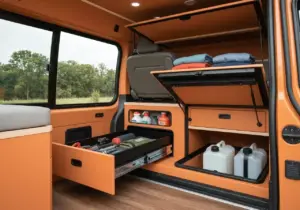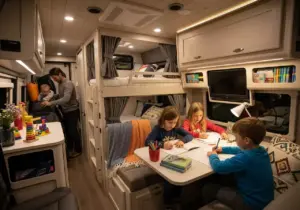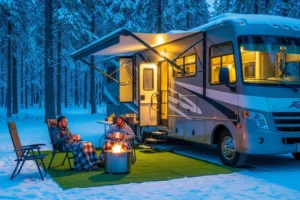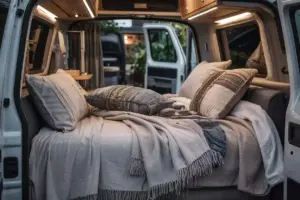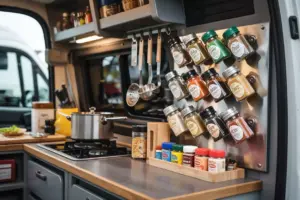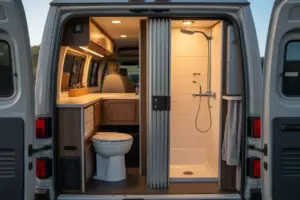Van Camping 101: Everything You Need to Know for Your First Trip
Picture this: you wake up to a stunning sunrise over a mountain lake, brew fresh coffee just steps from your bed, and have the freedom to move your “home” to a new breathtaking location whenever you choose. This is the magic of van camping – a lifestyle that combines the comfort of having your essentials with you and the adventure of exploring the great outdoors. Whether you’re dreaming of weekend getaways or extended road trips, camping in a van for beginners opens up a world of possibilities that traditional camping simply can’t match.
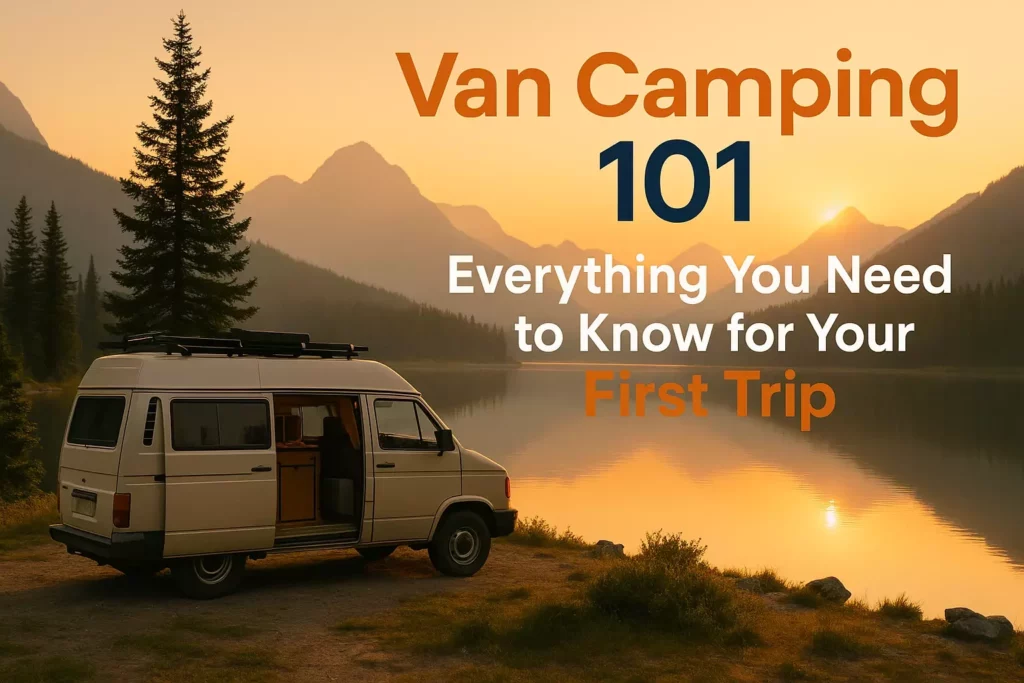
Van camping, also known as van life or camper van travel, has exploded in popularity as more people seek affordable ways to travel and connect with nature. Unlike tent camping, your camper becomes both your transportation and accommodation, offering protection from the elements while maintaining that authentic outdoor experience.
Key Takeaways
- Start small – Begin with weekend trips to test your setup and learn what works before committing to longer adventures
- Plan your essentials – Focus on the basics: sleeping, cooking, water, and storage solutions that fit your specific van and travel style
- Choose beginner-friendly destinations – Select campgrounds and locations with amenities like restrooms and water access for your first trips
- Budget wisely – Van camping can be cost-effective, but initial setup costs vary widely depending on your comfort level and DIY skills
- Prioritize safety – Always inform someone of your travel plans, carry emergency supplies, and research your destinations thoroughly
Choosing the Right Van for Beginners
The foundation of successful camping in a van for beginners starts with selecting the right vehicle. Your choice will impact everything from fuel costs to sleeping comfort, so it’s crucial to match your van to your specific needs and budget.
Popular Van Types for New Campers
Class B RVs offer the most amenities but come with higher costs and fuel consumption. These professionally built campers include bathrooms, kitchens, and sleeping areas, making them ideal for those who want convenience over customization.
Cargo vans like the Ford Transit, Mercedes Sprinter, or Ram ProMaster provide excellent conversion potential. These vehicles offer standing room height and ample space for custom builds, though they require more initial work to become camping-ready.
Minivans represent the most budget-friendly entry point. While space is limited, creative storage solutions and fold-down sleeping arrangements can make minivans surprisingly functional for short trips.
Key Features to Consider
When evaluating potential campers, prioritize these essential features:
- Reliability and maintenance history – Choose vehicles with good service records
- Fuel efficiency – Balance size needs with gas mileage for your budget
- Interior height – Consider whether you need standing room or can manage with lower ceilings
- Cargo capacity – Ensure adequate space for your gear and conversion plans
Essential Van Camping Gear and Equipment
Success in van camping depends heavily on having the right equipment. Focus on multi-purpose items that maximize your limited space while ensuring comfort and safety.
Sleeping Essentials
Your sleeping setup forms the backbone of van camping comfort. A quality mattress designed for van life, such as memory foam that can double as seating, provides better rest than traditional camping gear. Pair this with a properly selected sleeping bag rated for the temperatures you’ll encounter.
Cooking and Food Storage
A portable camping stove with adequate ventilation enables hot meals and coffee. Propane stoves offer consistent heat, while electric options work well if you have adequate battery power. Invest in a quality cooler or 12V refrigerator to keep food fresh and safe.
Water and Sanitation
Plan for at least one gallon of water per person per day for drinking, cooking, and basic hygiene. Portable water containers, a water purification system, and basic sanitation supplies ensure you stay healthy and comfortable.
Power Solutions
Consider your electrical needs carefully. Solar panels, portable batteries, and inverters can power lights, charge devices, and run small appliances. Start simple and expand your system as you learn your actual power consumption.
Planning Your First Van Camping Trip
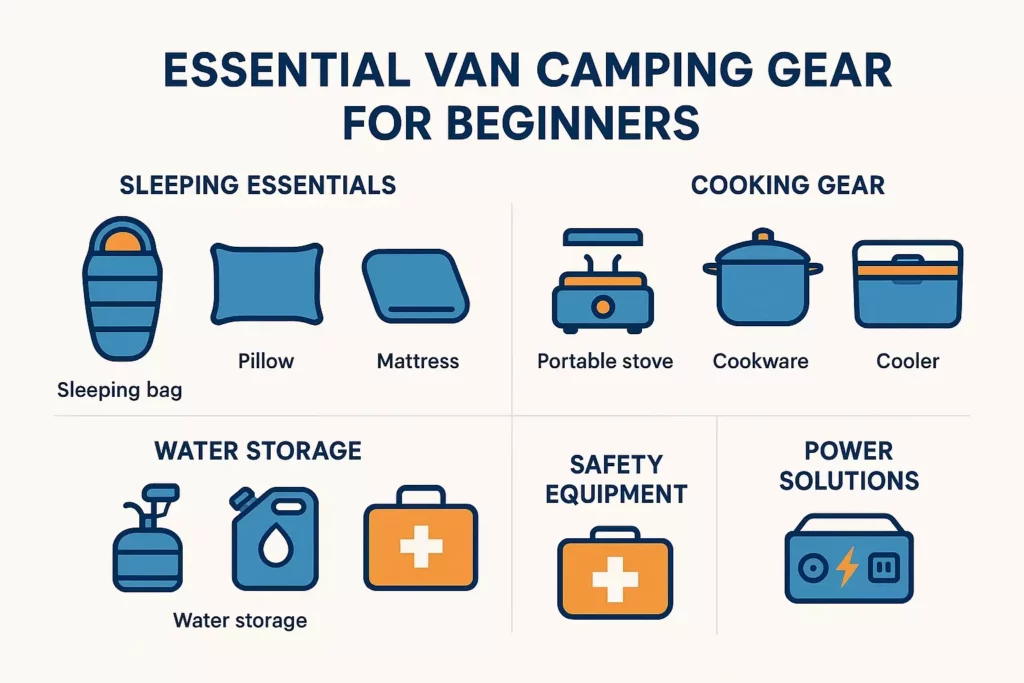
Proper planning transforms a potentially stressful experience into an enjoyable adventure. Start with shorter trips close to home to test your setup and build confidence.
Choosing Beginner-Friendly Destinations
Select campgrounds that offer amenities like restrooms, showers, and water access for your first trips. State parks often provide excellent facilities at reasonable costs, while some private campgrounds cater specifically to van campers with hookups and dump stations.
Research your route thoroughly, including fuel stops, grocery stores, and emergency services. Download offline maps and have backup navigation options, as cell service can be unreliable in remote areas.
Weather and Seasonal Considerations
Weather significantly impacts van camping comfort and safety. Check forecasts for your entire trip duration and pack appropriate clothing for temperature variations. Spring and fall often provide ideal conditions with moderate temperatures and fewer crowds.
Legal Considerations and Permits
Understand where you can legally park overnight. Many Walmart parking lots welcome overnight campers, but always check store policies first. National forests often allow dispersed camping, while city ordinances may prohibit sleeping in vehicles within municipal boundaries.
Setting Up Your Van Campsite
Creating a functional and comfortable campsite requires organization and respect for your surroundings. Your approach will vary depending on whether you’re staying at established campgrounds or boondocking in remote locations.
Campground Etiquette
Arrive during daylight hours when possible to properly assess your site and set up safely. Keep noise levels respectful, especially during early morning and evening hours. Properly dispose of all waste and leave your site cleaner than you found it.
Leveling and Positioning
Park on level ground whenever possible to improve sleeping comfort and appliance function. Position your van to take advantage of natural shade and prevailing breezes while considering privacy and views.
Safety and Security Setup
Always inform someone of your travel plans and expected return date. Keep emergency supplies easily accessible, including a well-stocked first aid kit and basic tools for minor repairs.
Van Camping Safety Tips
Safety should never be compromised for the sake of adventure. Proper preparation and awareness can prevent most problems before they occur.
Emergency Preparedness
Carry emergency supplies appropriate for your destinations and season. This includes extra food and water, warm clothing, a reliable communication device, and basic repair tools. A survival kit tailored for camping can be invaluable in unexpected situations.
Vehicle Maintenance
Perform pre-trip inspections including tire pressure, fluid levels, and battery condition. Carry spare fuses, belts, and basic tools. Know your van’s limitations and don’t exceed weight or towing capacities.
Personal Security
Trust your instincts about locations and situations. If something feels wrong, move to a different area. Keep valuables out of sight and secure your van when away from it. Consider window coverings for privacy and temperature control.
Budgeting for Van Camping
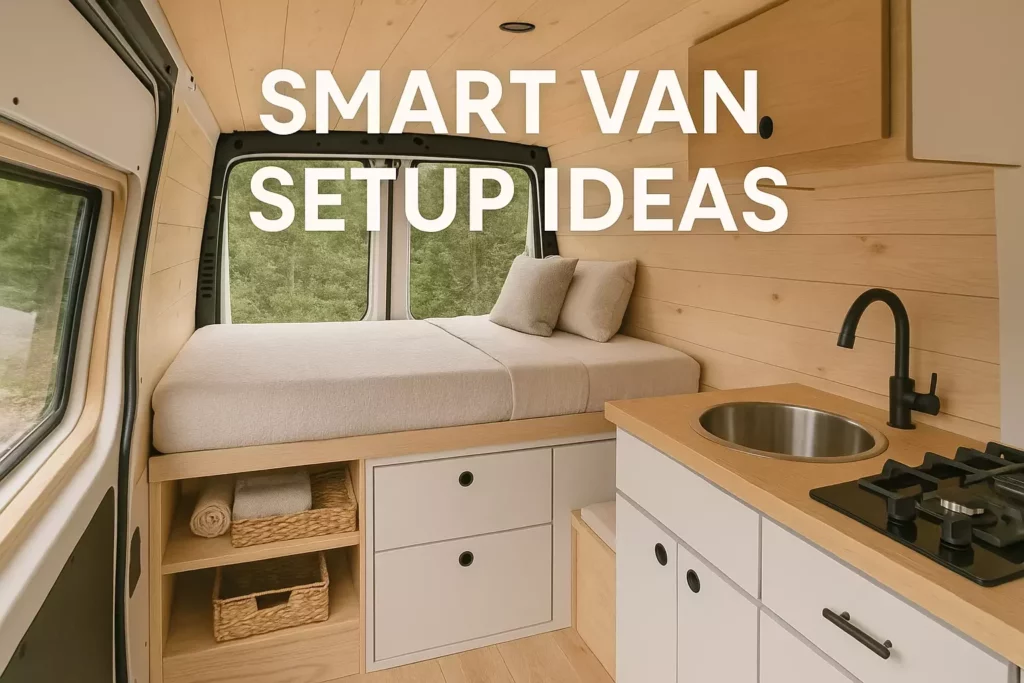
Van camping can be surprisingly affordable, but costs vary widely based on your choices and travel style. Understanding potential expenses helps you budget effectively and avoid surprises.
Initial Setup Costs
Van purchase represents your largest expense, ranging from a few thousand dollars for a used minivan to $100,000+ for a luxury Class B RV. Conversion costs depend on your DIY skills and desired amenities, from basic sleeping setups under $1,000 to full custom builds exceeding $50,000.
Ongoing Expenses
Factor in fuel costs, which can be significant depending on your van’s efficiency and travel distance. Campground fees typically range from free (dispersed camping) to $50+ per night for full-hookup sites. Food and supplies often cost less than traditional travel since you can cook your own meals and carry supplies.
Money-Saving Tips
- Start with basic equipment and upgrade gradually
- Choose fuel-efficient vehicles for frequent travel
- Mix paid campgrounds with free camping options
- Cook meals instead of eating out frequently
- Maintain your van properly to avoid costly repairs
🚐 Van Camping Trip Planner
Plan your perfect van camping adventure with personalized recommendations and budget estimates
Trip Details
Van Type & Budget
Preferences & Needs
Your Personalized Van Camping Plan
Common Van Camping Mistakes to Avoid
Learning from others’ experiences can save you time, money, and frustration. These common mistakes trip up many beginners, but they’re easily avoided with proper planning.
Overpacking and Weight Issues
New van campers often bring too much stuff, leading to weight problems and cluttered living spaces. Focus on essentials and multi-purpose items. Remember that you can buy supplies along the way rather than carrying everything from the start.
Inadequate Power Planning
Underestimating power needs leads to dead batteries and frustrated campers. Calculate your actual power consumption and plan accordingly. Simple solutions like portable battery packs often work better than complex electrical systems for beginners.
Poor Weather Preparation
Weather can change quickly, especially in mountainous areas. Always check forecasts and pack for conditions worse than predicted. Having appropriate clothing and emergency supplies can turn a potential disaster into a minor inconvenience.
Ignoring Legal Restrictions
Not all parking spots welcome overnight campers. Research local laws and respect private property. Getting ticketed or towed can ruin a trip and create expensive problems.
Van Camping with Families
Camping in a van for beginners becomes more complex when children are involved, but families can absolutely enjoy successful van camping adventures with proper planning and realistic expectations.
Space Management with Kids
Children need entertainment, comfort items, and space to move around. Plan for shorter driving days and frequent stops. Pack familiar comfort items and have backup plans for rainy days. Family camping activities can help keep children engaged and happy.
Safety Considerations for Families
Child safety requires extra attention in van camping situations. Secure loose items that could become projectiles during travel. Establish clear rules about staying near the van and supervise children closely around other campers and vehicles.
Educational Opportunities
Van camping provides excellent learning opportunities for children. Nature observation, basic outdoor skills, and responsibility for camp chores help children develop confidence and appreciation for the outdoors. Consider bringing field guides and simple science activities to enhance the experience.
Seasonal Van Camping Considerations
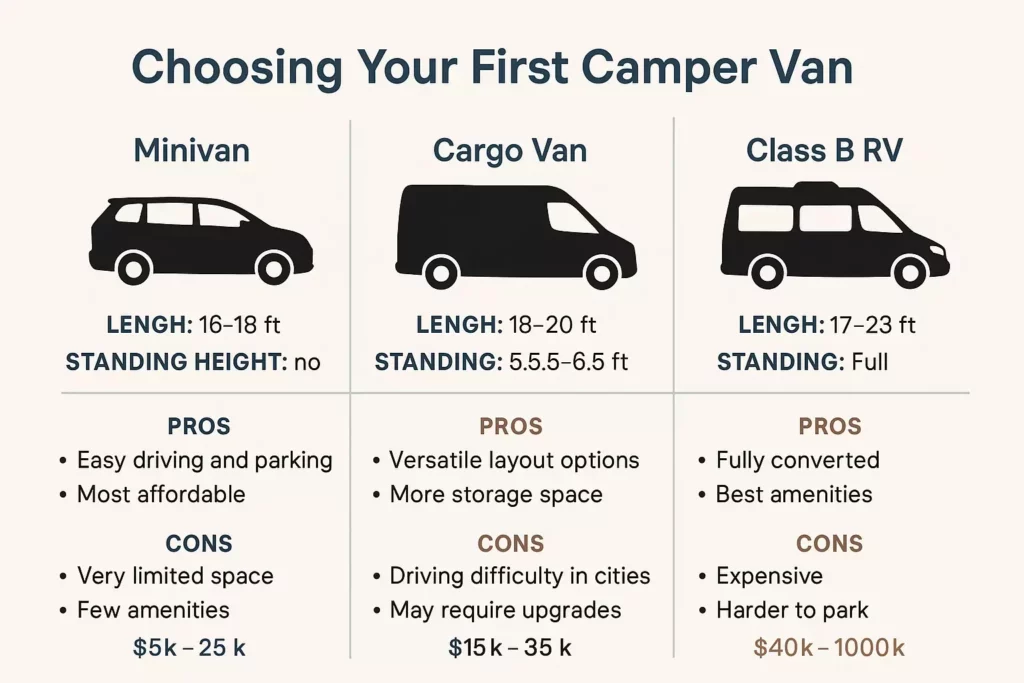
Each season brings unique challenges and opportunities for van campers. Understanding seasonal differences helps you prepare appropriately and choose the best times for your adventures.
Spring Van Camping
Spring offers mild temperatures and fewer crowds, but weather can be unpredictable. Pack layers and waterproof gear. Some high-elevation areas may still have snow, so research road conditions and campground opening dates.
Summer Adventures
Summer provides the most accessible camping conditions but also brings crowds and heat. Focus on higher elevations or northern destinations for cooler temperatures. Ensure adequate ventilation and consider battery-powered fans for comfort.
Fall Camping Glory
Fall delivers spectacular scenery with comfortable temperatures, but nights can be surprisingly cold. Pack warm bedding and check campground closure dates, as many facilities shut down after Labor Day.
Winter Van Camping
Winter camping requires serious preparation but offers unique beauty and solitude. Insulation, emergency supplies, and 4-season gear become essential. Start with short trips near home to test your cold-weather setup.
Building Your Van Camping Community
The van camping community is known for being welcoming and helpful. Building connections enhances your experiences and provides valuable support for beginners.
Online Resources and Forums
Join online communities where experienced van campers share advice, route recommendations, and troubleshooting tips. Social media groups often provide real-time information about road conditions and campground availability.
Van Camping Events and Gatherings
Attend van camping meetups and rallies to learn from experienced campers and see different van setups. These events offer opportunities to ask questions, make friends, and discover new destinations.
Sharing Knowledge and Experiences
As you gain experience, share your knowledge with other beginners. The van camping community thrives on mutual support and shared experiences. Document your trips and lessons learned to help others avoid common mistakes.
Conclusion
Van camping opens up a world of adventure that combines the comfort of having your essentials with you and the freedom to explore at your own pace. Success in camping in a van for beginners comes down to proper planning, starting small, and learning from each experience.
Remember that your first trip doesn’t need to be perfect – it just needs to be safe and enjoyable. Start with basic equipment and shorter trips near home. Focus on the essentials: comfortable sleeping arrangements, reliable cooking setup, adequate water and food storage, and safety equipment including a well-stocked first aid kit.
As you gain experience, you’ll discover what works best for your travel style and comfort preferences. Whether you’re planning weekend getaways or extended road trips, van camping offers an affordable and flexible way to explore the great outdoors while maintaining many of the comforts of home.
Your van camping journey begins with that first trip. Choose a destination within a few hours of home, pack the essentials, and embrace the adventure. The memories you’ll create and the freedom you’ll experience will likely have you planning your next van camping adventure before you even return home.
Start planning your first van camping trip today – the open road and countless adventures await!

